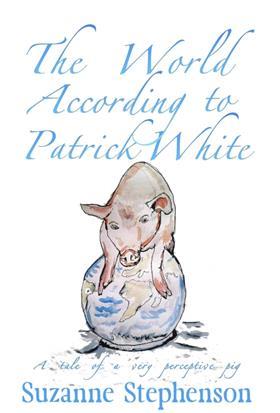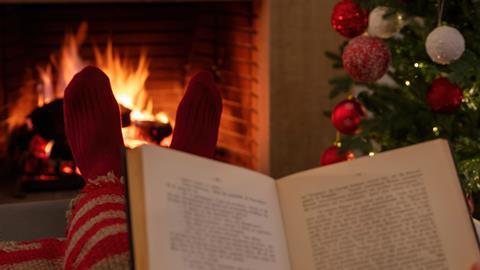Talking pigs, new and old lawyers and computer says 'yes'
I seem to be getting more virtual books than paperbacks or hardbacks. Being a dinosaur, I cannot read books online and so I print them off, hogging the office printer for hopefully not too long. As always this yearly review covers the amazing breadth of experiences that the legal profession has. I hope you enjoy my choices.
I begin with a reference to two brilliant books of memoires which were not published this year but their author passed away in July. Simon Brown was a Law Lord, then a justice of the Supreme Court from 2009 to 2012. He wrote two volumes of delightful memoires, Playing Off The Roof & Other Stories: A patchwork of memories (£20.00) and Second Helpings: & Last Scrapings (£11.75), both published by Marble Hill. They are splendidly chatty and brilliantly convivial accounts of an amazing career at the bar and the bench. His writing is far from stuffy or pompous and full of anecdotes. Apparently Amazon classified his first book as about DIY construction.
I start with work which we all have to do sometimes, but do we know much of the law of work?
The Legal Concept of Work
Zoe Adams
£110.00, Oxford University Press
What exactly is it and how does the law affect it? Where does it start and end? A solicitor’s office hours may be 9 to 5 but he or she will often come in early and stay late, take files home and answer emails and phone calls 24/7. If they then chat to a neighbour about what work they do and the neighbour’s friend comes to them with a legal issue, is that work as well? If you are employed then you might wonder if you are entitled to have a life outside work.
This is an academic study of the interaction between work and the law - how society has regulated different types of work and why. Labour law by definition is a struggle between often opposing parties with different agendas. This book discusses the function of work, how the law intervenes, work and time and gender issues. It ends with in-depth investigation into specific areas such as creative writing, academic work, medical professions and the retail industry.
I found the historical analysis interesting. In the medieval period there was no concept of hours of work. In 1495 legislation was introduced to prevent workers 'in late coming into their work... long sitting at their meals… [and] sleeping after noon.' The act fixed the working day from 5 am to 7 or 8 pm with two and half hours for meals and a sleep in summer. This lead to the regulation in the nineteenth century about young children and women.
This interesting subject affects us all as either employers or employees. What is the future of work? How do we plan the workforce requirements in terms of training and recruitment? How do we value workers or reward effort? This is directly relevant to our profession.
The great lawyer, Blackstone, regarded juries as 'the glory of English law.'
The Jury: A Very Short Introduction
Renee Lettow Lerner
£8.99
Why do we have twelve members of the jury? Why are they historically expected to make a decision they are all agreed on? Why do we lawyers have non-lawyers doing a legal job?
The right to have your guilt or innocence decided by a small group of neighbours is a historic and basic entitlement which has taken on almost sacred status. It is an ancient system of justice which is really just common sense. It is the common law’s gift to the world. They are welcome!

This is an excellent and fascinating short book written with an international emphasis by an American academic who, like many of her colleagues in America, admires and values English common law perhaps more than we do. The book introduces the subject with consideration of two films made in the same period, namely To Kill a Mockingbird and Twelve Angry Men, both of which have very different outcomes but deal with jury trial. She argues juries are popular as they have always been cost effective as they were not paid, nor even fed and watered, for most of their history. Judges like them because they deal with the most difficult and possibly controversial decision (guilt or innocence) and leave the easy bit (the sentence) to the judge. That is probably an overstatement but it is an interesting way of looking at why juries have lasted so long.
Juries have consistently been viewed as a most important safeguard against arbitrary rule and bullying, biased or politically motivated judges (perish the thought!). Certainly serving on a jury is the most important function an individual has.
Juries offer common sense and fairness. Although they are now fed and watered and free from the pressure there used to be on them and given expenses, they are really volunteers serving the community. Recently there has been pressure on the continued role of juries. Magistrates’ jurisdiction has increased, some offences are no longer triable either way, and some people say complex fraud trials should be decided by juries. Our commitment to jury trial is something the legal profession has got right. I was interested in an anecdote about a jury in a complex trial and the judge and counsel were most impressed with their attention to the case, taking many notes. It was revealed that they had devised a Sudoku completion as they were so bored!
DIY law is not something we would always recommend, but there is something for everyone in this book.
How to be A Litigant in Person in the New Legal World
Michael Langford
£10.99, Straightforward Publishing
The full title of this book is A Straightforward Guide to How to be A Litigant in Person Representing Yourself in the Civil Courts. It is a second edition and the first was entitled How to be A Litigant in Person in the New Legal World. The number of litigants in cases who are not represented by lawyers is steadily increasing. The causes of this are debateable and include rising legal fees, lack of legal aid or other funding such as advice agencies and pro bono schemes. Everything is now 'online' which in theory should make it easier for anyone to litigate as it is just a matter of filling in forms and there are many helpful DIY guides.
The first half of this book provides general advice about how to prepare a case, the stages of litigation and going to court. It is clear and well written and emphasises the importance of taking a step back to make sure the litigant, whether claimant or defendant, has a good case, then of reviewing the case as it proceeds and how to prepare and present the case in court.
The second half contains individual chapters on various types of case a litigant might attempt to tackle, such as housing (landlord and tenant), consumer cases, boundaries and rights of way, and finally inheritance law and will disputes. The section on consumer law contains a very useful discussion on assignments of debts, which is growing in importance as more companies buy up old bad debts. This neatly illustrates the fact that books like this often contain useful information for all of us including lawyers. The section on boundaries clearly states how unclear these matters are. Disputes about boundaries are proverbially difficult and expensive.
Now for a thriller.
The File
Gary Born
£26.95, Histria Books
A young botanist is on a scientific expedition in Africa and stumbles across the wreck of an aeroplane which had crashed in the rainforest and lain hidden for many years. The type of aircraft and the uniforms on the remains of the crew readily identify it as a Nazi war machine. It contains a metal cabinet full of documents. That file of papers is evidence of a secret conspiracy to bankroll a Nazi regeneration project after the defeat at the end of the Second World War. It also implicates the politicians and powerful families around the world who had betrayed their countries in return for Hitler’s money. The descendents of those people are still in power and in positions of authority and stand to lose everything if the secrets become known.
So starts a race by the Americans and Russians who are desperate to get the file of papers, no matter who or what gets in the way. They are ruthless, semi-professional, semi-official killers. The heroine of the story is the young botanist who tries to evade capture by escaping through the rainforest and then travels across Africa into Europe. The story ends with an exciting finale in central Europe in a financial centre.
There are lots of thrillers, and some are written by lawyers, but this stands out as a genuinely thrilling book. It is a compelling and exciting story and very entertaining. My interest was kept engaged and I kept wondering what would happened next and how the plot would twist and turn. Not all thriller writers are John Grisham, but Gary Born has done well.
The author, according to the book’s blurb, is a renowned international lawyer, having represented nations and businesses around the world. Born has practiced international arbitration and litigation in London for the past 30 years. He is the chair of the International Arbitration Practice Group at Wilmer Cutler Pickering Hale and Dorr LLP. He has sat as arbitrator in more than 275 institutional and ad hoc arbitrations. He is the author of International Commercial Arbitration (3d ed. 2021) and numerous other works on international dispute resolution.
Born chose thrillers because they are engrossing and he likes the inevitable international aspects and settings of spy thrillers. 'Writing fiction is both challenging and exciting in very different ways from legal writing. Legal writing involves very structured assignments that are restricted by the facts and by the law. In contrast, fiction writing happens on a blank piece of paper, with literally anything and everything available as material: even a chapter about, say, a meeting or a gunfight can be set almost anywhere, with almost anything happening. That freedom is enormously exciting and exhilarating, but also daunting.'
Got to grips with emails yet? Apparently Igor Judge, lord chief justice of England and Wales, thought technology was an anathema.
Handbook of Legal Tech
Consulting editor: Colin S. Levy
£149.00, Globe Law and Business
'Computer Says Yes?'
How will technology change the legal profession, for better or worse? It will change, that is inevitable, but it is usually the negative experiences that we recall. I seem to spend a lot of time trying to figure out the online portals that are designed to save money and trouble (presumably for the organisation not the user). They often have webchat facilities, FAQs and help lines which disappoint. To use these portals you need passwords, usernames and mobile phones for codes, to say nothing of remembering your favourite cat’s maiden name and first parent’s name. Technology is not there yet.
This is an interesting book dealing with all that is new in the confusing and bewildering tech world. I enjoy the international flavour and the comparisons with the American legal world which in many ways is similar to ours and in other ways so different.
What will be the effect of technological developments? These seem to have moved so fast. I remember word processors that took up a whole office and the first mobile telephones not much smaller. Technology has limits. We all know the disaster of tech going wrong. It is easy to make a mistake and send everything to the wrong person. Will it make us better lawyers? Perhaps one benefit is move away from billing by time and more by value of the work done. Will tech free us up to give lawyers more free time? I doubt it somehow.

Did the judge get it wrong?
Making Decisions Judicially: A Guide for Decision-Makers
Godfrey Cole and many others
£24.99, Hart Publishing
Books on judicial decision making are essential reading for those who write the judgments and the rest of us who read them. Decisions of courts and other bodies need to be fair, clear, and understandable. The party who is successful needs a decision that is clear and it may need to be enforced and the party that came second needs to understand the reasons for the decision so they can take any necessary action including whether an appeal is possible.
There has been considerable training for judges in recent years on this subject, partly driven by interest in making courts accessible to all parties including vulnerable witnesses and the increase in unrepresented litigants. There are innovations in making these decisions understandable to all concerned. Court judgments have been described as a 'letter to the loser', and so they are.
The impact of Covid and technological developments will alter courts. Video hearings must save time and expense and make courts accessible to people with mobility issues or disability. Another interesting innovation is the idea of Ground Rules Hearings which started in criminal courts to identify any accessibility and vulnerability issue and enable an open discussion with the judge or body to enable the best evidence and full participation of witnesses. This book has a good explanation on these issues. There are also excellent sections on judge-craft and good style and sooner or later all books on this subject refer to Lord Denning. He is the master of judicial style!
Reason writing is not easy or straightforward. Judges are only human. This is an excellent book on the subject and vital reading for decision makers and those of us who advise the winners and losers.
And finally an expert who has first-hand or first-trotter experience.
The World According to Patrick White: A tale of a very perceptive pig
Suzanne Stephenson
£10.99, Mirador Publishing
This delightful story is about a solicitor who combines her legal practice with farming. That seems a great idea in these days when technology makes different ways of working a possibility and it is a good opportunity to gain expertise of our clients’ needs in business and legal problems.

The heroine of the tale has a number of animals on her farm including a talking pig. The pig gives his name to the book title and is very pleasant, personable and polite as well as being intelligent and articulate. Patrick is curious about the world he and his human family inhabit. He learns to read, watches television and listens to music. Patrick the pig gets to know his family and enjoys a successful career helping to increase the breed. The lawyer gets involved in an agricultural court case with a farming client. Partly to save costs the pig writes an expert report on porcine behaviour.
And a very good report it is: it complies with rules, sets out his experience and qualifications and reassures the court he is impartial. The story’s climax is the day in court. (How do you get a pig in court?) On the day he also meets a member of the royal family and a bishop. The judge is surprisingly accommodating and understanding.
This a delightful and entertaining book which would make an ideal Christmas gift for lawyers. Perhaps the moral of the tale is a pig is surprising well-bree=d, polite and pleasant company and some people live like animals.
Whether you are getting to grips with assassins, experts, juries, judges or pigs, have a great Christmas and buy lots of books!
David Pickup is a partner at Pickup & Scott Solicitors, Aylesbury
































1 Reader's comment